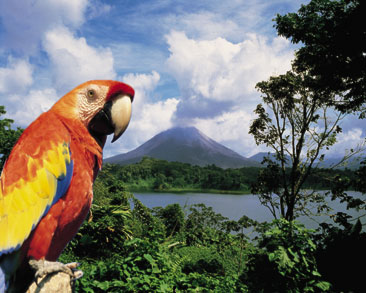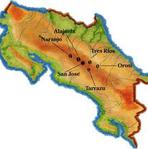COSTA RICA IMMIGRATION & MOVING EXPERTS
Frequently Asked Questions
1.) Q. The cost of living is our main concern.
Is it very expensive to live in Costa Rica?
Here's a breakdown of different segments of day-to-day life which reflect the cost of living in Costa Rica. .
a. Automobiles: Either purchased here or brought with you, the rate of duty is approximately 55%. So, it is safe to say that automobiles & trucks will be more expensive than you are used to. The good news is that automobiles, boats and airplanes. . a total of two. Applicants must have a legal status in order to apply for these incentive.
b. Food: Imported food, as you can well imagine, is quite expensive. But local food (and remember this country is really one giant food basket), is extremely fresh, extremely well-priced and readily available. At the local outdoor markets, ¢10,000 (approximately US$20.00) will purchase enough fruits and vegetables to feed a family for a week. Supermarkets carry a diverse selection of both local and imported foodstuffs. Almost any item is available nowadays in Costa Rica.
Walmart is even here now and they carry their "Equate" brand!
c. Clothing: Prices vary from high to moderately priced. The fact is that due to the almost-perfect weather we enjoy in Costa Rica, we are never shopping for the next season. The same flip flops, same shorts & same baseball hat can be used year around.
d. Housing: Across the board, every level of pricing, every level of amenities and every type of location is available. Because individual tastes vary so much, the general rule that we use is that if a couple has their home and auto paid for and have a monthly income of US$2,000, they live like Kings & Queens.
2.) Q. What type of weather can be expected?
A. There are 22 microclimates all stuffed into our little country. There can be sunshine in one area of the country day after day while 20 kilometers away, rain will fall almost every afternoon. There are basically 2 seasons here. . .Dry (brown) Season, where you can pretty well count on 4-5 months of no rain and. . .
Green (wet) Season, where you can pretty well count on investing in (and wearing out) a couple of umbrellas. Both seasons have their individual beauty. The ongoing discussion here is not so much politics or economy, but rather discussing the merits of each season and defending the choice of seasons one chooses.
In the Central Valley, high temperatures will typically be in the mid 20’s (celsius), lows in the high teens.
The beach areas would add on an average of 10 degrees to the
Central Valley’s averages. The humidity is more intense as well.
It is recognized that Costa Rica enjoys the world's most favorable weather. Quite a claim. . .but one in which this writer agrees!
3.) Q. What constitutes a family from the perspective of the Costa Rican government's immigration policy?
A. The adult and spouse must be legally married or their application for residency will be considered as having been submitted individually. In other words, the government does not recognize common-law marriages. They do recognize same-sex marriages. Children of the married couple will have their application(s) submitted at the same time as the adults. A child is considered, by definition, as an individual under the age of 18 or age 25 if still a student or physically dependent on parents. If your son or daughter is older than age 25, they will have to submit their own application and qualify as an individual.
4.) Q. How much time should we allot to have our application submitted to Immigration and how many trips will it require?
A. Typically we require 3 hours to complete the local paperwork. Applicants must be here in Costa Rica for this part of the process.
Once the 'limited power of attorney' is signed, we take over and your presence is not required until approval of your application.
5.) Q. Do I need an official legal status in Costa Rica in order to purchase a home?
A. The short answer to this question is no. Without a legal status, you remain a tourist. As a tourist, you can live here, purchase a home, drive a car and enjoy pretty much everything that a Costa Rican or legalized expat does. As a tourist you must ensure that your Visa is current and this is done by what is locally called “making a border run” to have that Visa renewed. Typically, you must leave every 180 days, but varies depending on your country of origin. You can spend as little time as a couple of hours outside of Costa Rica and your visa will be renewed typically for another 180 days. Also, without a legal status, you are not privy to many other incentives available.
6.) Q. After submitting our paperwork to Immigration and while waiting for the official receipt of our cedula, can a person work?
A. No. All three of the most popular types of legal statuses are considered Temporary and as such the individual is not permitted to work.. I.E., take a job away from a Costa Rican citizen or from a person who has received Permanent status. After 36 months, you can apply for a Permanent Status, which upon receipt will allow you to work here in Costa Rica.
7.) Q. When I first apply for residency, what type of status am I applying for?
A. Typically you would have applied for Pensionado, Rentista or Resident Investor Status. All three statuses are considered "temporary". After you have your status for 36 months, you would apply for, and expect to receive, Permanent Pensionado status, Permanent Rentista or Permanent Resident-Investor status, which allows you to operate your own business and compete with other Costa Ricans in the local work force.
8.) Q. Is it wise to remain a perpetual tourist if you really intend, eventually, to obtain a legal status?
A. No it is not wise. We refer to the “Perpetual Tourist” as the brother-in-law staying in the 3rd bedroom of the family home. When the homeowner decides it is time for the brother-in-law to leave, then off he goes. No recourse. He is out of there. As a tourist, you do not have any legal status and as a matter of convenience for “officialdom”, if for no other reason, you could be asked to leave by Immigration. There is no recourse or appeal.
9.) Q. What are the odds of Immigration asking a perpetual tourist to leave?
A. Between slim and none but here is an example of what can and does happen.
The tourist gets involved in some altercation with a local Costa Rican. The tourist’s car hits the Costa Rican’s dog on the street. In the tourist's eyes, he has just gotten rid of a noisy problem in the neighborhood. To the Costa Rican, he has just suffered the loss of his prized family pet. The problem comes to a standstill. The tourist won’t pay and the Costa Rican wants justice for this dog being killed. The Costa Rican contacts immigration and upon review the problem is solved. You would be required to leave.
If you have overextended your visa you may be told to leave the country immediately. This would depend on the amount of time you have overstayed the time frame. Typically, you would be fined an amount of US$100.00 per month per person for however number of months one overstayed. That fine most likely will suffice as the penalty but in certain instances, case by case you may be required to stay out of the Country for a period of three time the number of days you overstayed.
10.) Q. Can I ship my household furnishings. . .
my stove, fridge, television, paintings, etc?
A. Yes. Contact us for further details.
11.) Q. Can I bring my car, my boat or airplane with me to Costa Rica?
A. Yes. Keep in mind the incentives offered from Law #9996. Contact us for details.
12.) Q. What do the letters, "S.A." mean after the corporation's name?
Costa Rica is not in South America, is it?
A. It is surprising how many times we are asked those 2 questions. First,
Costa Rica is located in Central America and secondly, "S.A." stands for,
"Sociedad Anonima", which for all intents and purposes translates or is equivalent to, "LTD." elsewhere in the world.
14.) Q. When we make the decision to make the move to Costa Rica,
how do we get our “stuff” down to our new home?
A. Contact us for information..
15.) Q. Should we bring our car?
A. It's a personal decision, but we can only advise as follows. If the type of car you have is popular here, thinking about repairs and parts, is in good condition and has a low resale value if you were to sell it in your current home country, then we would recommend that you consider shipping it. Further details upon request, but if we have certain information regarding the car such as age, options, VIN #, age and model, our team can give you a very accurate amount of duty that will need to be paid. The additional consideration is that basically if it fits into your container, consider it shippable. Same criteria applies to boats, jet-skis, motorcycles, etc.
17.) Q. Why does the Government make bringing in refrigerators so difficult and other appliances come in so easily?
A. One word…Freon. A number of merchants were bringing over container loads of old refrigerators and refurbishing them here and them selling them for a huge profit. No problem that but so many of these fridges we on their last ice cube that within months, they gave up the cooling spirit and were hauled off to the landfill. Thus an overabundant number of “dead” fridges giving up their freon as a parting gift to Costa Rica. Now, there is a new requirement just issued requiring that all refrigerators, freezers, etc., need to have an import license before the item will be released by customs. We need age, model and serial number of each freezer, fridge or such appliance well before the arrival of your shipment here so we cn have the import permit issued.
18.) Q. How can I become a client?
A. It is a matter of comfort level. We encourage people to ask questions regarding our services. When you are satisfied, we present you with a written quote/invoice, covering all costs for our services offered. Typical payment is done via bank wire transfer. Transfer instructions will be attached to your quote/invoice. Take a look at our entire website. Lots of good information here.
19.) Q. What happens if the the Costa Rican Government changes the requirements: For example, Immigration?
A. Whichever rules that are in effect the day that you receive your cedula are the rules that apply to your application. The exception is when the changes are to the applicant's benefit.
20.) Q. What happens if we have not received all our documents back from the various government agencies by the time we leave for Costa Rica?
A. This is not a problem. A major part of our services is to assist the client in the collection of, the Apostilling of and the forwarding of all necessary documents to our Costa Rica office.
21.) Q. Are there any extra charges for specific services needed, such as obtaining a drivers license, shopping at local malls, cell phone purchases, etc?
A. We are very pleased to assist in many ways to ensure that your transition to Costa Rica and your new lifestyle is a total positive experience. Whether it be a case of needing assistance to obtain your
Costa Rica drivers license or to obtain a suitable cell phone or to be taken to one of our major shopping centers or shopping clubs, we are here to accompany you & assist you in every way we can. Although this extra service is gladly offered, in some cases it entails the use of additional people / man hours.
22.) Q. When we come to Costa Rica, are we allowed to drive?
A. Yes, if you have a valid drivers license from your home country, then you can use that license while here as a tourist. If you have no plans to establish a Legal Status, you must leave the country every 180 days to obtain a new tourist status. To keep your home country's drivers license valid, you must leave the country every 180 days.
23.) Q. Why is my former home country's drivers license no longer considered valid when I have my legal residency?
A. Because you are now a legal resident of Costa Rica and as such, must have a Costa Rican drivers license.
24.) Q. When I get my legal status, can I continue to drive on my
home-country license?
A. It is imperative that you obtain your Costa Rican drivers license once you have your legal status. You are officially no longer a tourist here, thus your drivers license from your home country which was valid while you were a tourist is no longer valid.
25.) Q. Is there a written or oral test required to obtain my Costa Rica drivers license?
A. No. If your home country’s license is still valid, then it is a simple matter of an eye exam, blood test and the payment of the required fee, usually around $25.00.
26,( Q. We understand the Government has created a new type of legal status called “Nomad." How can we qualify for this?
A. It is imperative that one understands that Nomad is not a status, but rather a visa. A visa that permits a person to temporarily live and work here for up to two years at which time the visa would be cancelled and the individual(s) would be without benefits.
13.) Q. Is medical treatment expensive and is it good?
.A. We have 2 medical programs in Costa Rica, but the one most people at retirement age should concern themselves with is our "medical social security system". The main reason we say this is that with the latest change in the immigration law, it has been mandated that all people will participate in this system. In fact, when you apply for your residency card (cedula), you will show proof of participation. The cost is based on your declared income. The more you declare as income, the more you would pay. The quality of care is excellent (excellent not only at the clinics, but throughout the country).
One of the most positive reactions we receive from people using the CAJA program is how efficient, pleasant and personable the doctors and staff are. Are all clinics knockoffs of the Mayo clinic or John Hopkins? No but they function well, serve the people well and provide good service on site or via referring patients to the large S.S. hospitals for major problems. Hospital Mexico, located here in Costa Rica is a S.S. hospital and is famous in Central America for its heart transplants (free transplants if the individual cannot afford the operation).
The other medical system is called the "INS" which provides another level of service. By using this system, there is a rather large annual premium to be paid and approximately a 70% remuneration for treatment. The big benefit of INS is that you can expect the same doctor to treat you on every occasion that you make an appointment. Nicer facilities also, but at a cost.
The additional consideration regarding medical: the quality of the medical services here in Costa Rica is recognized to the extent that the country is becoming a mecca for the international medical tourism business. Basically, every procedure and treatment that is available in your home country, plus many that are not available, are standard procedure here.
16.) Q. If we are coming to Costa Rica and plan to submit our paperwork for our legal status, can we purchase one-way tickets only to Costa Rica?
A. Tickets proving a return flight to your home country or proof of ongoing travel is required. Your ticket should indicate that your planned stay in Costa Rica does not exceed 180 days which is the amount of time typically a tourist is granted. I would suggest that when you are at the check-in counter at YOUR airport in your hometown, ask for a printed itinerary. Have it ready to present to the Immigration officer here in Costa Rica if requested.




